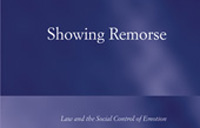 A book by Richard Weisman, professor emeritus of social science in the Faculty of Liberal Arts and Professional Studies at York University, has been accorded significant recognition by the American Sociological Association. Weisman’s book Showing Remorse: Law and the Social Control of Emotion (2014), published by Ashgate as part of the Canada Series: Law, Justice and Power, has received Honourable Mention from the Committee for the Distinguished Book Award for 2014 of the Sociology of Law Section of the American Sociological Association.
A book by Richard Weisman, professor emeritus of social science in the Faculty of Liberal Arts and Professional Studies at York University, has been accorded significant recognition by the American Sociological Association. Weisman’s book Showing Remorse: Law and the Social Control of Emotion (2014), published by Ashgate as part of the Canada Series: Law, Justice and Power, has received Honourable Mention from the Committee for the Distinguished Book Award for 2014 of the Sociology of Law Section of the American Sociological Association.
Using examples drawn from Canada, the United States, and South Africa, Weisman demonstrates that the showing of remorse is a site of negotiation and contention between groups who differ about when it is to be expressed and how it is to be expressed. Weisman’s book illustrates these points by looking at cases about which there was conflict over whether the wrongdoer should show remorse or whether the feelings that were shown were sincere. Building on the earlier analysis, Weisman shows that the process of deciding when and how remorse should be expressed contributes to the moral ordering of society as a whole.
Weisman’s current research analyzes the social processes by which remorsefulness and remorselessness are claimed by self and attributed by other. Law is one important site for this process in that considerations of remorse enter into judgments about parole, sentencing, dangerous offender status in Canada and capital punishment in the United States.
The book is available from Ashgate.


